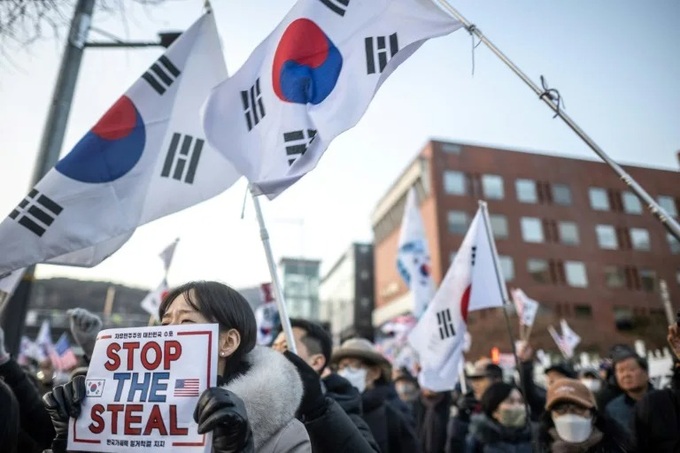
A protester holds a placard reading "Stop the Steal" during a rally to support impeached South Korean President Yoon Suk Yeol (Philip FONG) (Philip FONG/AFP/AFP)
The embattled leader issued the bungled declaration on December 3 that led to his impeachment and has left him facing arrest, imprisonment or, at worst, the death penalty.
Supporters and opponents of Yoon have since camped outside his presidential residence, while members of his security team have blocked attempted police raids in a dramatic stand-off.
Yoon has gone to ground but remained unrepentant as the crisis has rolled on, issuing a defiant message to his base days before a warrant expires on January 6.
"The Republic of Korea is currently in danger due to internal and external forces threatening its sovereignty, and the activities of anti-state elements," he said in a statement passed around to protesters, his lawyer Yoon Kab-keun confirmed to AFP.
"I vow to fight alongside you to the very end to protect this nation," he added, saying he was watching the hundreds-strong protest Wednesday evening on a YouTube live stream.
The impeached leader remains in the capital Seoul, the lawyer confirmed to AFP.
Opposition lawmakers were quick to condemn Yoon's message as inflammatory, with Democratic Party spokesperson Jo Seoung-lae calling him "delusional" and accusing him of trying to incite clashes.
Yoon's legal team has filed for an injunction to block the warrant and claimed Wednesday that the arrest order was "an unlawful and invalid act".
But Corruption Investigation Office (CIO) chief Oh Dong-woon warned that anyone trying to block authorities from arresting Yoon could themselves face prosecution.
South Korean officials have previously failed to execute arrest warrants for lawmakers -- in 2000 and 2004 -- due to party members and supporters blocking police for the seven-day period the warrant was valid.
- Refused questioning -
Discussions between prosecutors and police are taking place in the background of a political crisis that initially saw the country briefly lurch back to the dark days of military rule.
But the martial law order -- which he said was aimed at eliminating "anti-state elements" -- only lasted a few hours.
Heavily armed troops stormed the building, scaling fences, smashing windows and landing by helicopter, but Yoon was quickly forced into a U-turn after a night of protests.
He was then stripped of his presidential duties by parliament and now faces criminal charges of insurrection that could result in life imprisonment or even the death penalty.
Yoon has since refused summonses for questioning three times and doubled down on claims the opposition was in league with South Korea's communist enemies.
In the wake of his refusal, supporters have raced to Seoul to support him.
As night fell on Wednesday, pro-Yoon protesters spewed vitriol at police while waving glowsticks and anti-impeachment placards.
A constitutional court will rule whether to uphold Yoon's impeachment.
The turmoil deepened late last week when Yoon's replacement, Han Duck-soo, was also impeached by parliament for failing to sign bills for investigations into his predecessor.
Finance Minister Choi Sang-mok has been installed as acting president and pledged to do all he can to end the political upheaval.
He has since decided to appoint two new judges to the constitutional court hearing Yoon's impeachment -- meeting a key demand of the opposition, but branded an overstepping of his powers by Yoon's staff.
Choi took office on Friday and found himself immediately thrust into handling a disaster, after a Jeju Air plane crashed on Sunday, claiming 179 lives.
